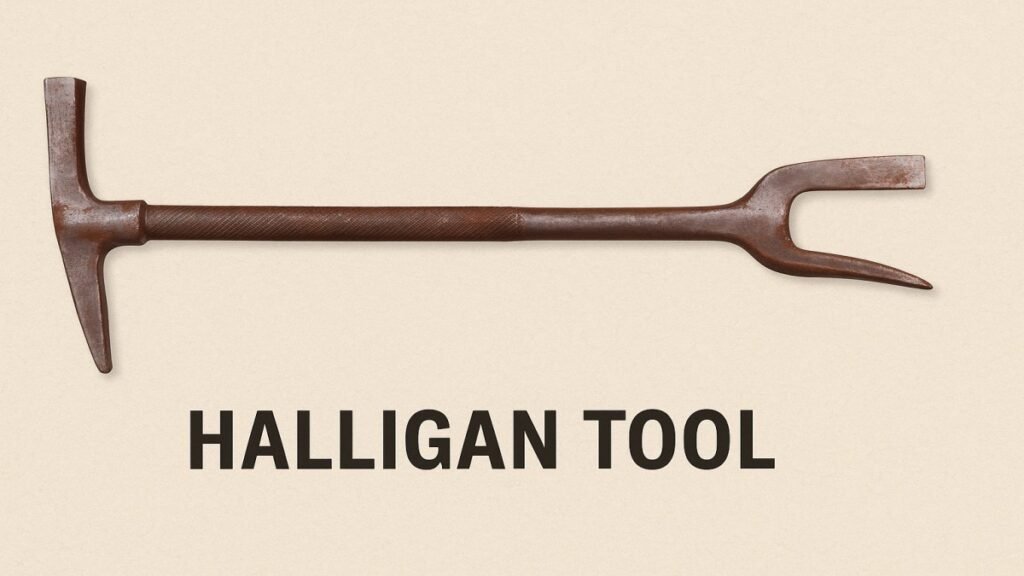Introduction
If there’s one tool that every firefighter swears by, it’s the Halligan tool. It’s not flashy, and it doesn’t need to be. It’s rugged, reliable, and downright brilliant in design. Used in everything from house fires to highway rescues, this iconic multipurpose tool is the silent hero of emergency scenes.
History of the Halligan Tool
Inventor and Origin
The Halligan tool was created in 1948 by Hugh Halligan, a First Deputy Fire Chief of the New York City Fire Department (FDNY). Frustrated by the limitations of existing tools, Halligan combined multiple functions into one super tool.
Purpose of Its Creation
Its goal? Make entry faster, safer, and more efficient. Firefighters needed something that could pry, pierce, twist, smash — and the Halligan answered that call.
Evolution Over Time
While the basic design has remained mostly unchanged, newer materials, different sizes, and enhanced combos have made the Halligan even more versatile.
Anatomy of a Halligan Tool
The Fork (Claw)
The curved fork pries open doors and windows. It also slips between tight spaces like a dream.
The Adze (Wedge)
This flat, chisel-like edge forces entry when slammed into a door frame or jammed between panels.
The Pick (Spike)
The pointed end punctures locks, latches, or even car panels in extrications.
Material and Length
Most are made of forged steel, 24 to 36 inches long, giving you the perfect balance of leverage and control.
Primary Uses
Forcible Entry
The Halligan shines here. Doors, locks, and windows don’t stand a chance when it’s properly used.
Vehicle Extrication
Need to peel back a car door or pop open a trunk? Halligan’s got you.
Search and Rescue
Whether it’s prying debris or clearing entryways, it’s invaluable in time-sensitive rescues.
Utility Shut-Off
Many Halligans include cut-outs or tips for shutting off gas lines and water valves in emergencies.
Tactical Techniques
Gap, Set, Force
This classic method starts with creating a gap, setting the tool firmly, then forcing the object open — all in seconds with practice.
Team Coordination
When used with a flathead axe (called “the Irons”), one firefighter strikes while the other positions — a perfect team dance.
Solo vs. Partner Use
It’s powerful solo, but even more effective with a partner using the striking tool.
Why the Halligan Stands Out
Versatility
You’re carrying three tools in one, cutting down on weight and bulk.
Durability
Made for harsh environments — fire, smoke, water, debris. It won’t quit before you do.
Portability
It fits into belts, backpacks, or truck mounts, and it’s always ready.
Variants and Modifications
One-Piece vs. Multipiece
Some models break down for easy transport; others are forged from one block of steel.
Bar Lengths
Lengths range from 18 to 42 inches, depending on the task and need for leverage.
Combo Tools
Many versions come integrated with axes or sledgehammers, giving you a one-hand arsenal.
Halligan and the Firefighter’s Toolkit
The “Irons”
A Halligan + Flathead Axe = “The Irons” — the gold standard combo for rapid entry.
Tool Compatibility
Works well with:
- Hydraulic spreaders
- Cutting tools
- Saws
Storage Tips
Mount it near the front of the truck for quick access during rapid deployment.
Real-Life Scenarios
Urban Search and Rescue
Collapsed buildings, jammed elevators — Halligan helps clear paths quickly.
High-Rise Operations
Perfect for breaking into secured apartments or utility access rooms.
Vehicle Accidents
Break windows, pop hoods, or gain access to trapped passengers.
Safety Considerations
Proper Grip and Stance
Bad grip = bad injury. Proper technique keeps you safe and efficient.
Misuse Risks
Don’t use it as a hammer or throw it. It’s tough, but not indestructible.
Training Matters
Every second counts. Practicing with the Halligan is essential for efficiency.
Maintenance and Care
Cleaning Tips
Remove soot, dirt, and grime after every use.
Inspection
Check for cracks, warping, or loose components.
Storage
Dry it thoroughly to prevent corrosion. Store in an easily accessible location.
Conclusion
The Halligan tool isn’t just a piece of metal — it’s a lifesaving innovation. From fire scenes to tactical entries, it’s the go-to for professionals who face danger daily. Its simplicity, strength, and adaptability make it a must-have in any emergency toolkit. If you’re ever in trouble, you’ll be glad a Halligan was nearby.
FAQs
1. Why is it called a Halligan tool?
It’s named after its inventor, Hugh Halligan, of FDNY.
2. What’s the difference between a Halligan and a crowbar?
Crowbars can pry, but the Halligan is multi-functional — designed for tactical operations.
3. Is training needed to use a Halligan?
Yes. Technique matters — improper use can be dangerous.
4. Can civilians buy a Halligan tool?
Yes! It’s available online for collectors, survivalists, or emergency workers.
5. What is “The Irons”?
It’s a Halligan combined with a flathead axe — the ultimate entry combo.








